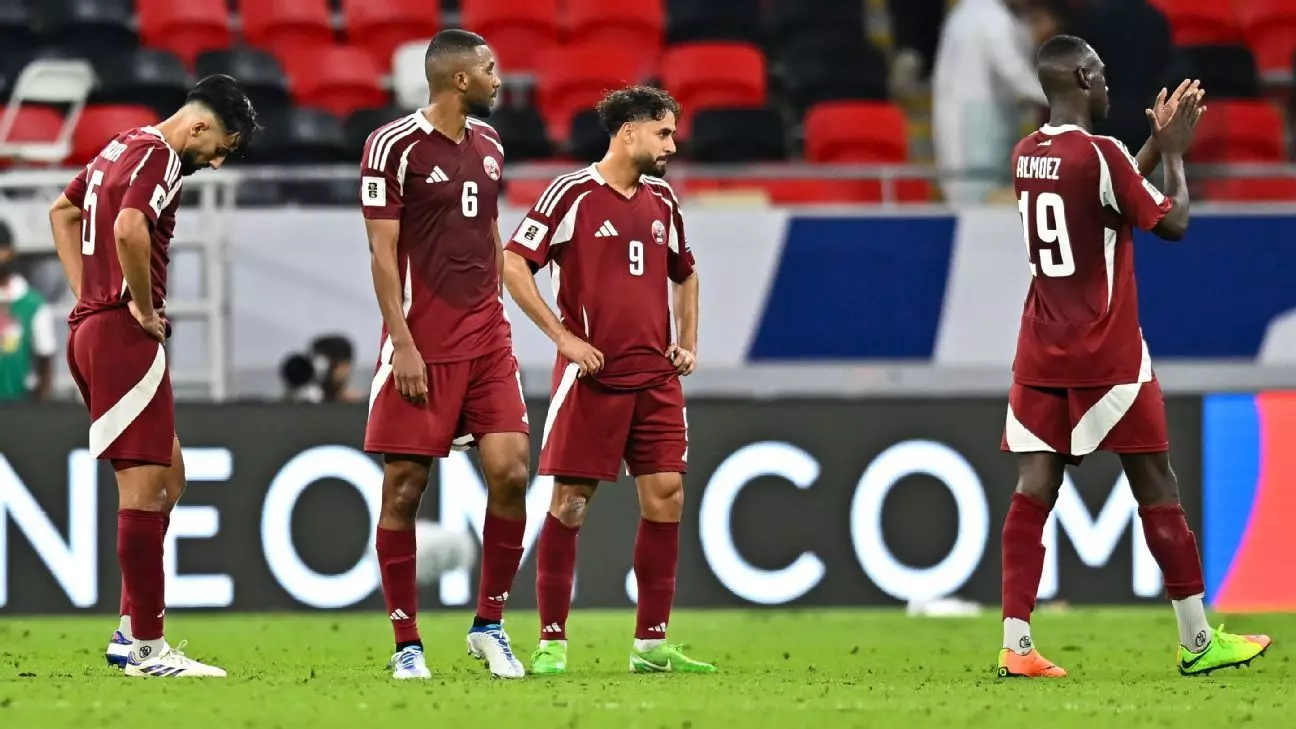The buzz surrounding Qatar’s football scene reached a fever pitch following their historic hosting of the FIFA World Cup in 2022. The anticipation for their return to international competition was heightened, particularly with the World Cup’s expansion to 48 teams in 2026, promising more opportunities for teams across continents. Qatar, boasting recent accolades as the reigning champions of the Asian Football Confederation (AFC) after clinching the AFC Asian Cup in 2019 and 2023, seemed primed to build on that success. Yet, as the current round of Asian qualifiers unfolds, the nation finds itself in disarray, a stark contrast to its previous triumphs.
As the third round of AFC qualifiers progresses, Qatar’s performance has been nothing short of alarming. Six matches into the process, the team sits in a disappointing fourth place in Group A, collecting a mere seven points from two wins and drawing comparisons to a beleaguered ship adrift at sea. With their defensive record marred by a staggering 17 goals conceded—the worst in the group—they face a daunting challenge from other national teams. The primary competitors, including Iran and Uzbekistan, were anticipated challenges; however, Qatar’s poor form against UAE and even against teams like North Korea has cast serious doubts on their capacity to qualify.
The recent 5-0 drubbing by UAE would have been a particular stinger. After conceding three goals before half-time and failing to retaliate, the reality struck hard—this isn’t the team that once thrived on the international stage. Qatar’s defensive crises have not only harmed their standings in the group but have also undermined players’ confidence and cohesion within the squad.
What’s perplexing is how a nation with such recent pedigree on the continental stage could rapidly spiral into obscurity. The last five years saw Qatar rise to prominence, yet now, a reevaluation of their strategies appears necessary. Many have speculated that their focus on immediate successes, particularly in the Asian Cups, could be contributing to their present woes. Traditional stalwarts of the team like Boualem Khoukhi and Abdulaziz Hatem have been relied upon heavily, despite aging out of their prime playing years. Critics argue this over-reliance on veteran talent has hindered the reintegration of fresh energy within the squad.
However, an examination of Qatar’s player pool reveals a mixture that could be advantageous if managed properly. Young talents such as Akram Afif and Almoez Ali still have much to offer to the national team, alongside emerging players like Ibrahim Al-Hassan. The blending of seasoned experience with youthful vigor could prove vital for Qatar as they reevaluate their footballing strategy.
A significant factor adding to Qatar’s struggles seems to be the tactical indecision exhibited by head coach Tintín Márquez. Since his appointment, Márquez has alternated formations and playing styles, seemingly in search of an ideal system that ultimately remains elusive. Changing between a 5-3-2 against Uzbekistan and a 4-3-3 against UAE raises questions about not only consistency but also the players’ comfort levels in their respective roles. Key players are being deployed in unfamiliar positions, resulting in a disconnect between the team’s strategies and their execution on the pitch.
Further complicating matters is the transitional phase of leadership following the retirement of distinguished players like Hassan Al-Haydos. While Akram Afif has seamlessly stepped into the captaincy role, the pressure of leadership is different from the responsibilities of a star player. The loss of experienced individuals can fracture team dynamics, evidenced by the observed lapses in motivation and direction on the field.
Despite their current predicament, Qatar’s road to recovery isn’t totally without hope. The final four games of the qualifiers present a pivotal opportunity to redefine their trajectory. Accumulating enough points could serve as a springboard not only to extend their qualifying campaign but also to facilitate necessary realignments in strategy and personnel selection. There’s a palpable urgency among players and management alike to recalibrate and execute a plan that maximizes talent while fostering unity and identity within the squad.
As the clock ticks and pressure mounts, Qatar must forge their path. The heartache of missed opportunities stemming from poor decision-making, outdated tactics, or lapses in performance can ultimately be transformed into lessons learned. With determination and a commitment to evolve, Qatar can aspire not just to reset the course of their qualifying journey, but to re-establish their status as a competitive force within Asian football. The next chapter in their story could very well rely on a confluence of introspection, strategy, and the indomitable spirit that led them to previous successes.

